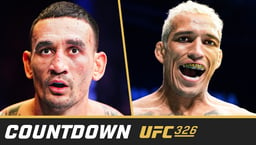
Issue 079
September 2011
I have just finished reading Brock Lesnar’s autobiography Death Clutch, with Paul Heyman, his longtime confidant. Riveting stuff. And pretty funny, in parts, too. Like the revelation that he had no hair under his armpits until he left high school, and was the last to reach puberty in his class. Six foot tall, 210lb, and hair only on his head.
He also reveals his distaste for Frank Mir. In Lesnar’s words “the man who was born with a golden horseshoe up his ass.” Lesnar still grows angry when he thinks of that loss to Mir. Interesting, too, that he chose not to pursue the 2000 Olympics because he “no longer wanted to be broke.”
He also explains it took some time to become a standout in his college wrestling days, which few people are aware of. Let’s hope it is not the last we see of the man mountain in the Octagon after 12 inches of his intestine were removed after a second serious bout of diverticulitis.
It was intriguing to read of Lesnar’s lowest point, just before he joined the UFC. It is the shortest chapter of the book, entitled ‘The Sword,’ and is just two pages long. He had failed to make it into the NFL. He had no job, and had signed a ‘non-compete’ clause with the WWE, having left the organization after being miserable there.
That signature cost him a pile of money as his lawyers fought to get him out of it, but Lesnar shows he is human like the rest of us. “With all these pressures piling up, one on top of the other, I was depressed. Every day, I was drinking more and more vodka, chasing down more and more Vicodins… I was angry, I was drunk. I was pilled up. I was going to do some damage to someone or something. My first victim? Myself! I ended up in a biker bar in Pheonix, right next door to which… there just happened to be a tattoo parlor. I felt like life was holding a sword up against my throat, so I went under the ink gun because I never wanted to forget exactly how I felt at the time.” Lesnar might have been drunk and pilled up when he got it, but the sword is “a constant reminder of all the things that changed my life,” he says.
“I look at that sword almost like it was a family crest,” says Lesnar. It is his inspiration to fight back. “There is one thing I know deep in my heart about myself, it’s that I am not a quitter. I am a warrior, and I will never let anything or anyone, keep me down.” Come back soon, Brock, the sport is richer with your presence.
DANA CAN’T ACT
Have you seen UFC president Dana White in the barroom scene in that Bud Light beer advertisement flagging up the UFC’s ‘Battle on The Bayou’ event in New Orleans on September 17th? If you haven’t, then take it from me… Dana can’t act.
Jon Jones is also in the ad, and looks to have a touch of the Will Smiths about him, but it is clear that when White acts, he is not himself. That delights me. Now Dana gets a fair amount of flack in the ink and online for being “emotional” when he reacts with gut instinct on such things as fighters’ performances, refereeing decisions and judges’ cards. But I’d argue that his openness gets the issue out there straightaway. I reckon it’s why the fans identify so readily with him. The sentiment is clear: stuff the judges when they are so wrong. But what White cannot control, and what clearly needs addressing, is the education of judges in MMA.
The issue is the most pressing in the sport. The system works, and given that it is a subjective sport, there will always be some variance on opinion and cards. But when it is so diverse, it has to be of concern. Just as there are Unified Rules, there should be a unified judging school, where all judges attend courses and are graded as to their knowledge and suitability, regardless of which state athletic commission assigns them. Over the past year, retirees and Hall of Famers Randy Couture and Chuck Liddell have both agreed in interviews with Fighters Only they would readily be involved in such a scheme. They’d like to sit down and watch replays of controversially judged fights, with the likes of Dave Hagen and ‘Doc’ Hamilton, to see how judges are scoring bouts – in some cases way wide of the mark. It’s time to act. But it’s all about education.
...









